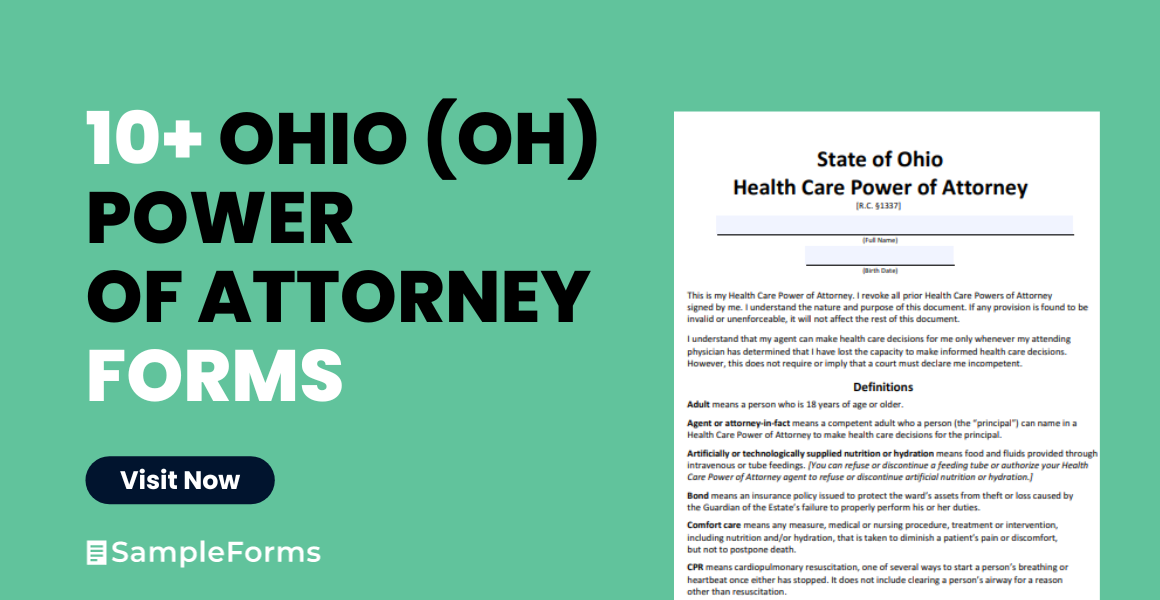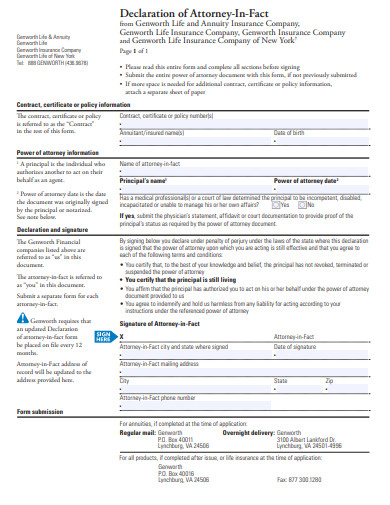Navigate the complexities of the Ohio Power of Attorney (POA) Form with our expert guide. Tailored for Ohio residents, this resource simplifies the process of granting legal authority to another person. Whether for financial, healthcare, or personal decisions, our guide provides essential tips and clear instructions to ensure your POA is legally sound and aligns with your specific needs. Ideal for those seeking to manage their affairs or those of a loved one with confidence and legal accuracy.
What is the Ohio Power of Attorney Form?
The Ohio Power of Attorney Form is a legal document that allows someone, known as the principal, to appoint another person, called the agent or attorney-in-fact, to make decisions and act on their behalf. This form is used in Ohio for various purposes, such as handling financial matters, making healthcare decisions, or managing other personal affairs, especially when the principal is unable to do so themselves. It’s a crucial tool for legally delegating decision-making authority.
What is the Best Sample Ohio Power of Attorney Form?
Creating a sample Ohio Power of Attorney (POA) form involves including key elements to make it comprehensive and adaptable. However, it’s important to note that for actual legal use, consulting with a legal professional is advisable to ensure the form meets all legal requirements and is tailored to specific circumstances. Below is a basic structure for a sample Ohio POA form:
OHIO POWER OF ATTORNEY FORM
Principal’s Information:
- Name: [__________]
- Address: [__________]
- Phone Number: [__________]
Agent’s Information:
- Name: [__________]
- Address: [__________]
- Phone Number: [__________]
Powers Granted:
- Financial Decisions
- Real Estate Transactions
- Personal Property Management
- Healthcare Decisions
- Other: [Specify: __________]
Special Instructions:
[Provide any specific instructions or limitations on the agent’s power here.]
Effective Date:
- This Power of Attorney shall become effective on [Date: //____].
Duration:
- Durable (remains in effect even if I become incapacitated)
- Non-Durable (ends if I become incapacitated)
- Springing (becomes effective upon a specified event or condition)
Signature of Principal:
- Signature: [__________]
- Date: [//____]
Signature of Agent:
- Signature: [__________]
- Date: [//____]
Acknowledgment by Notary Public:
[Notary Public’s area for stamp and signature]
This sample form is designed to be fillable, allowing the principal to easily input their information and customize the powers granted to the agent. Remember, each situation is unique, and the form should be tailored to fit specific needs and legal requirements.
1. State of Ohio Power of Attorney Form
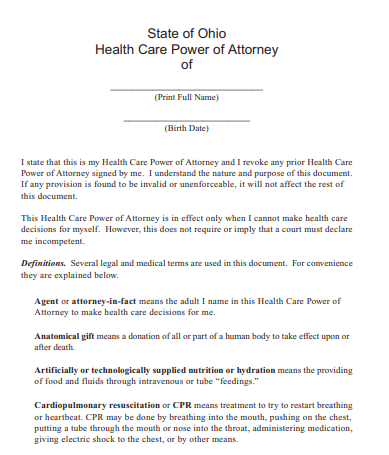
2. Ohio IRS / Form 2848 Power of Attorney Form
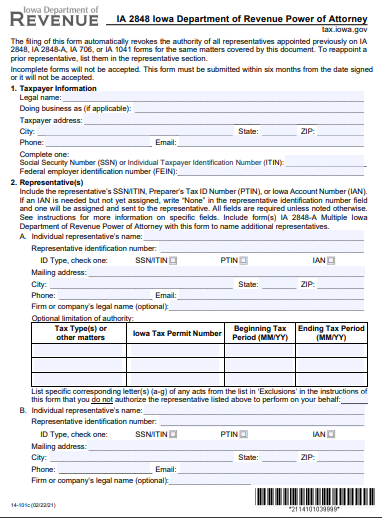
3. Ohio Insurance Power of Attorney Form
4. Ohio Vehicle Power of Attorney Form
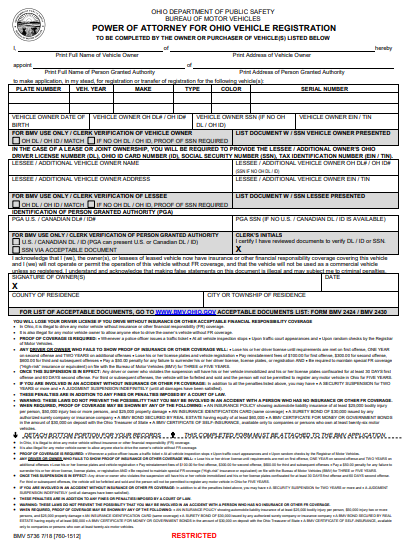
5. Ohio Statutory Power of Attorney Form
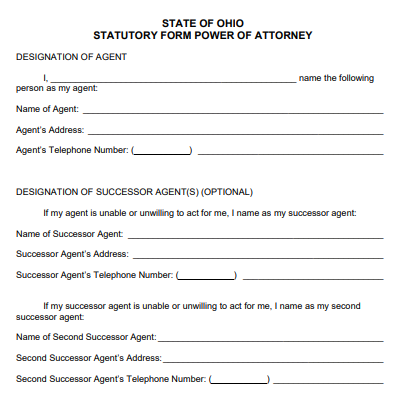
6. Ohio Special Power of Attorney Form
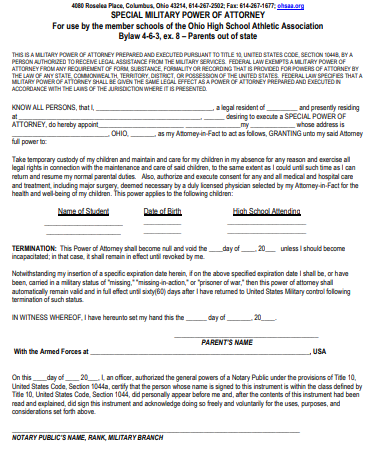
7. Ohio Power of Attorney Form
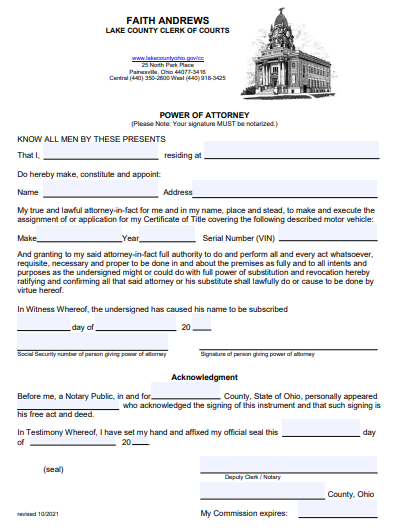
8. Ohio Limited Power of Attorney Form
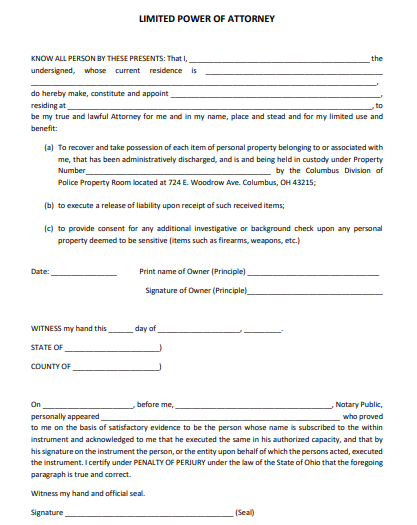
9. Ohio Health Care Power of Attorney Form
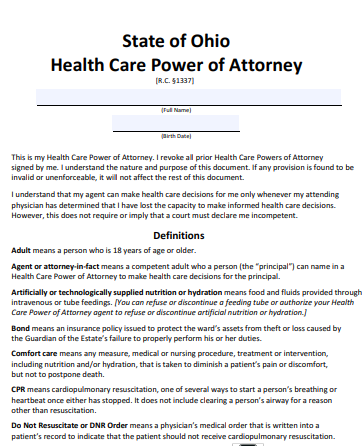
10. Ohio General Power of Attorney Form
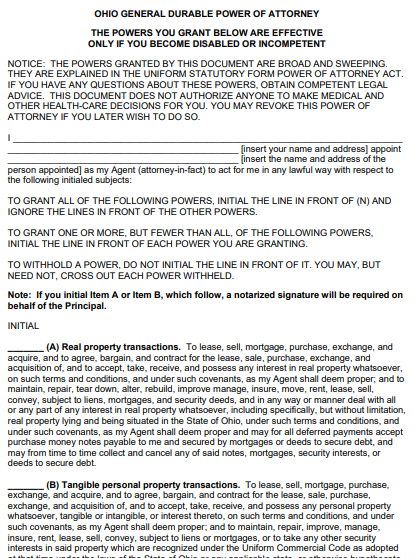
11. Ohio Durable Power of Attorney Form
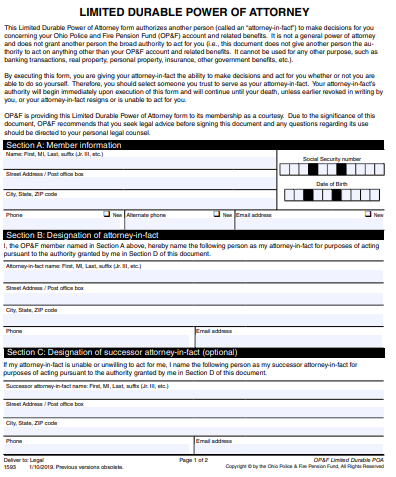
How do I Get Power of Attorney Papers in Ohio?
Obtaining Power of Attorney papers in Ohio involves selecting the right form, filling it out correctly, and following legal procedures for validation.
Examples:
- Selecting the Correct Form: Choose a form that matches your needs (financial, healthcare, etc.).
- Filling Out the Form: Provide accurate details of the principal and agent.
- Legal Requirements: Ensure compliance with Ohio state laws.
- Notarization: Get the document notarized for legal validity.
- Consulting Legal Advice: Seek advice from a legal professional for accuracy.
What is Power of Attorney for Ohio State?
Power of Attorney in Ohio State is a legal document allowing someone to make decisions on your behalf, covering areas like finance, health, or property.
Examples:
- Financial Management: Handling financial affairs.
- Healthcare Decisions: Making medical choices.
- Real Estate Transactions: Managing property dealings.
- Legal Representation: Acting in legal matters.
- Personal Affairs: Overseeing personal issues.
What is a BMV Power of Attorney Form 3771 in Ohio?
The BMV Power of Attorney Form 3771 in Ohio is a specific document used to grant authority to another person for vehicle-related matters, like title transfers.
Examples:
- Vehicle Transactions: Authorizing vehicle sales or purchases.
- Title Transfers: Handling the transfer of car titles.
- Registration Matters: Managing vehicle registration.
- BMV Interactions: Representing in Bureau of Motor Vehicles.
- Legal Delegation: Officially delegating vehicle-related authority.
Who Can Override a Power of Attorney Ohio?
In Ohio, a Power of Attorney can be overridden by the principal, a court order, or under certain conditions outlined in the POA document itself.
Examples:
- Principal’s Revocation: The principal can revoke the POA.
- Court Intervention: A court can invalidate the POA.
- Agent’s Incapacity: If the agent becomes unable to act.
- Legal Violations: If the agent acts outside their authority.
- Expiration of POA: Upon reaching its specified end date.
Does a Power of Attorney Need to be Filed in Ohio?
In Ohio, a Power of Attorney doesn’t necessarily need to be filed unless it’s for real estate transactions, where it must be filed with the county recorder.
Examples:
- Real Estate POA: Filing required for property matters.
- Non-Real Estate POA: No filing needed for other types.
- County Recorder’s Office: Filing location for real estate POAs.
- Legal Validity: Filing enhances legal recognition.
- Public Record: Makes the POA a public document.
What is a POA in Ohio for Car Title?
A POA for a car title in Ohio is a document granting someone authority to handle car title-related matters, like transfers or registrations, on your behalf.
Examples:
- Title Transfer: Authorizing title change.
- Registration Processes: Handling vehicle registration.
- Sale Authorization: Power to sell the vehicle.
- BMV Representation: Acting on your behalf at the BMV.
- Legal Delegation: Officially delegating title-related tasks.
Does Ohio POA Need to be Notarized?
Yes, in Ohio, a Power of Attorney needs to be notarized to be legally valid, ensuring the authenticity of the document and the identity of the signer.
Examples:
- Legal Authentication: Notarization confirms the principal’s signature.
- Fraud Prevention: Helps prevent fraudulent POA creation.
- State Requirement: Aligns with Ohio legal mandates.
- Document Integrity: Enhances the POA’s credibility.
- Third-Party Acceptance: Ensures institutions recognize the POA.
How to Prepare an Ohio Power of Attorney Form
Preparing an Ohio Power of Attorney (POA) form is a crucial process for legally authorizing someone to act on your behalf. Here’s a detailed guide to ensure your POA is effective and compliant with Ohio laws.
- Understand the Types of POA: Familiarize yourself with different types of POA available in Ohio, such as General, Durable, Healthcare, or Limited POA.
- Choose the Right Agent: Select a trustworthy individual who understands your needs and is capable of making decisions in your best interest.
- Draft the POA Form: Use a standard Ohio POA form or create a custom one. Include essential details like your name, the agent’s name, and the specific powers granted.
- Define the Powers Clearly: Specify the exact powers you are delegating, whether they are financial, medical, or pertaining to real estate.
- Include a Durability Clause: If you want the POA to remain in effect if you become incapacitated, include a durability clause.
- Sign and Notarize the Document: In Ohio, your POA must be signed in the presence of a notary public to be legally valid.
- Store the Document Safely: Keep the original document in a secure place and provide copies to your agent and relevant institutions.
- Review and Update Regularly: Circumstances change, so it’s important to review and update your POA as needed.
Tips for Using an Effective Ohio Power of Attorney Form
To ensure your Ohio POA is used effectively, consider these tips:
- Clear Communication: Discuss the POA with your agent to ensure they understand their responsibilities and your expectations.
- Limit Powers as Necessary: Grant only the powers that are necessary for your agent to carry out their duties effectively.
- Monitor the Agent’s Actions: Keep track of the decisions and actions taken by your agent.
- Understand Revocation Process: Know how to revoke the POA if needed, and inform your agent and relevant parties about the revocation.
- Legal Compliance: Ensure that the POA complies with current Ohio laws and regulations.
- Seek Professional Advice: Consult with a legal professional for complex situations or if you have specific legal questions.
- Inform Relevant Parties: Make sure that financial institutions, healthcare providers, and others who may be affected by the POA are informed about its existence and terms.
By following these steps and tips, you can create and use an Ohio Power of Attorney form that effectively communicates your wishes and ensures your affairs are managed according to your specifications.
What Are the Rights of a Power of Attorney in Ohio?
In Ohio, a Power of Attorney grants rights to make decisions on financial, healthcare, or personal matters on behalf of the principal, within the scope defined in the POA document.
What Are the Limitations of a Power of Attorney?
A Power of Attorney’s limitations include inability to change the principal’s will, make decisions after the principal’s death, and act beyond the authority granted in the POA document.
How Long Is Power of Attorney Good for in Ohio?
In Ohio, a Power of Attorney remains valid until the principal’s death, unless it’s revoked, or if it’s a Durable POA, it continues despite the principal’s incapacitation.
Can You Have Two Power of Attorneys in Ohio?
Yes, in Ohio, you can appoint two Power of Attorneys, either granting them authority to act separately or requiring them to make decisions jointly.
Can a Power of Attorney Be Revoked in Ohio?
Yes, a Power of Attorney can be revoked in Ohio at any time by the principal, provided they are mentally competent, through a written notice to the agent and relevant parties.
This guide on Ohio Power of Attorney forms provides a comprehensive roadmap for creating and using a POA effectively. It emphasizes the importance of understanding rights, limitations, and the duration of POAs in Ohio. Remember, a POA is a powerful tool for managing your affairs, and it can be tailored and revoked as per your changing needs, ensuring peace of mind and legal compliance.
Related Posts
-
10+ Free Nevada (NV) Power of Attorney Form Download – How to Create Guide, Tips
-
10+ Free Nebraska (NE) Power of Attorney Form Download – How to Create Guide, Tips
-
10+ Free Montana (MT) Power of Attorney Form Download – How to Create Guide, Tips
-
10+ Free Missouri (MO) Power of Attorney Form Download – How to Create Guide, Tips
-
10+ Free Minnesota (MN) Power of Attorney Form Download – How to Create Guide, Tips
-
10+ Free Mississippi (MS) Power of Attorney Form Download – How to Create Guide, Tips
-
10+ Free Massachusetts (MA) Power of Attorney Form Download – How to Create Guide, Tips
-
10+ Free Maryland (MD) Power of Attorney Form Download – How to Create Guide, Tips
-
10+ Free Maine (ME) Power of Attorney Form Download – How to Create Guide, Tips
-
10+ Free Louisiana (LA) Power of Attorney Form Download – How to Create Guide, Tips
-
10+ Free Kentucky (KY) Power of Attorney Form Download – How to Create Guide, Tips
-
10+ Free Kansas (KS) Power of Attorney Form Download – How to Create Guide, Tips
-
10+ Free Iowa (IA) Power of Attorney Form Download – How to Create Guide, Tips
-
10+ Free Indiana (IN) Power of Attorney Form Download – How to Create Guide, Tips
-
10+ Free Illinois (IL) Power of Attorney Form Download – How to Create Guide, Tips
